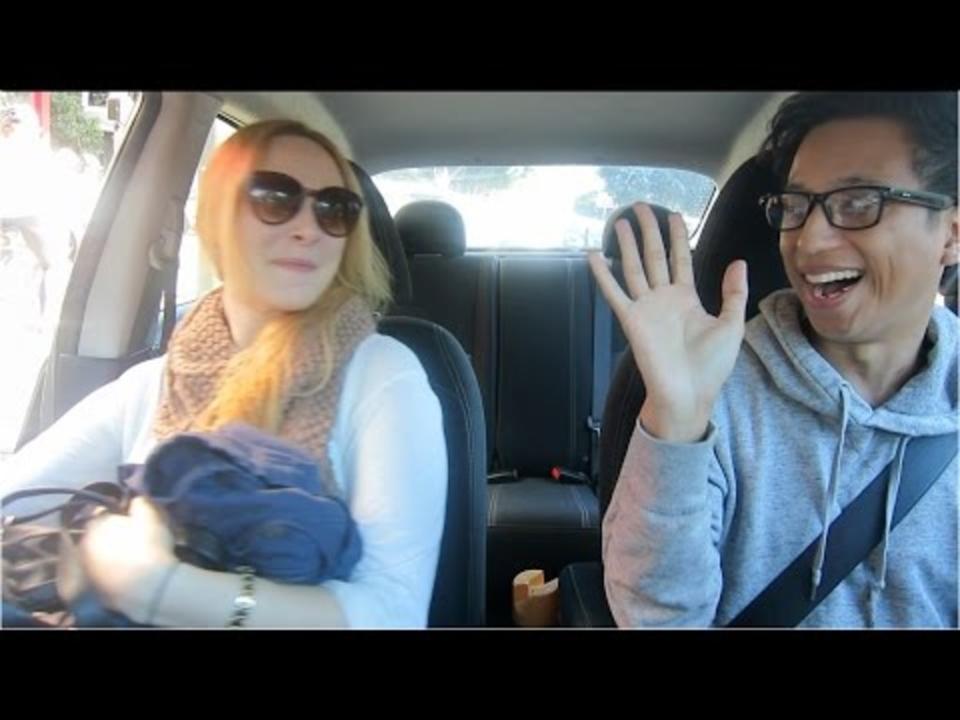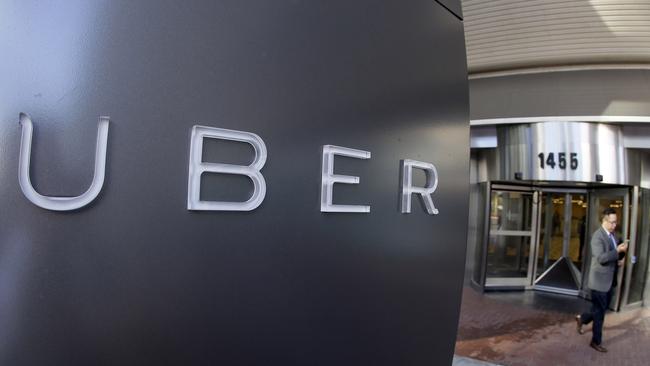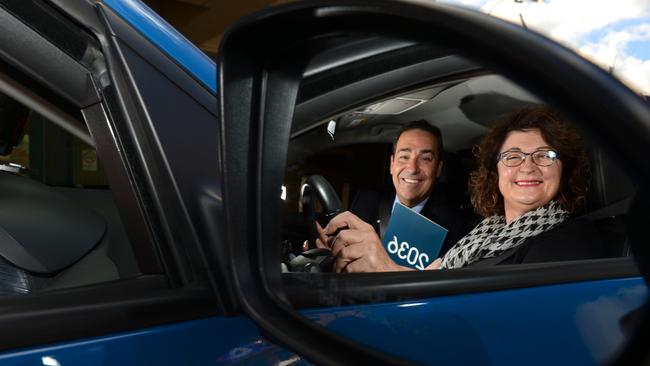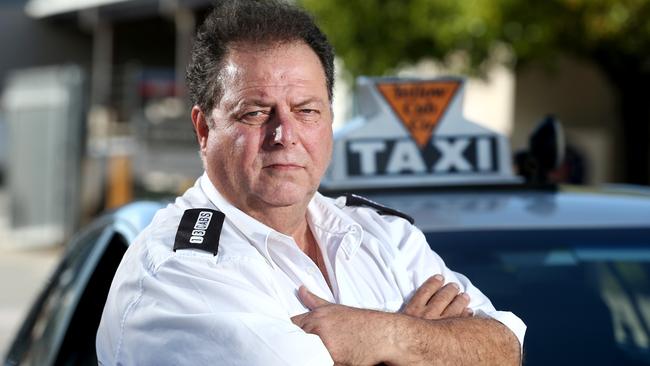Uber X to become legal in South Australia under laws introduced by Weatherill Labor Government
UPDATE: The first new competitors in South Australia’s transport sector have begun operating just a day after the State Government legalised new ride-sharing models.

SA News
Don't miss out on the headlines from SA News. Followed categories will be added to My News.
- OPINION: Jim Triantafyllou, Taxi Council SA
- BATTLE: Uber fights for its fair share in SA
- BACKGROUND: Uber keen to recruit drivers in Adelaide
- UBERBLACK: Uber granted limited approval to operate in SA
- TRIED AND TESTED: Advertiser reporter takes ride with UberX
THE first new competitors in South Australia’s transport sector have begun operating just a day after the State Government legalised new ride-sharing models.
Taxi booking app Ingogo has been providing payment terminals to about 700 South Australian taxi drivers but the new laws allow the company to now offer its app booking service to local passengers.
The app enables users to book a taxi for an immediate pick up or up to 48 hours in advance, including pre-booking a taxi to Adelaide airport.
“We are glad to be able to extend the same level of service that we offer our customers in Brisbane, Sydney, Melbourne and Perth to travellers in Adelaide,” ingogo founder and CEO Hamish Petrie said.
“From today, drivers in Adelaide will be able to accept bookings and find customers through the app, which extends their reach, and provides customers throughout the city with the convenience of being able to book taxis instantly, and up to two days in advance, through their phone.”
App-based and ride-sharing companies, such as Ingogo and UberX, will be allowed to operate in South Australia from July 1 as part of sweeping reforms to the state’s taxi and hire car industry revealed today.
Under the changes the Government, passengers across all platforms will be charged a $1 levy per ride to compensate taxi licence plate owners and drivers for allowing new entrants into the market. It will raise about $80 million over the next decade.
A new tariff, of up to 20 per cent, will also be introduced for taxi fares on Friday and Saturday nights when drivers face high demand and often drunk or unruly passengers.
A general taxi fare increase will be imposed and new on-the-spot fines created.
It comes in response to to an independent review of the taxi and hire car industry, which was delivered in late February.
Cabinet approved the changes on Monday.
The majority of changes will take effect by July 1, however some will require legislation to pass Parliament.
However, the reforms have been slammed by the taxi industry and Uber is yet to commit to expanding its services in SA, saying it would still be too costly and time-consuming.
The Taxi Council of SA said the government’s $1 levy per trip on passengers to fund a compensation package for drivers should have been borne by the Uber operators instead.
Mr Mullighan today told reporters the reactions were “completely natural” but he believed the reforms struck a fair balance.
Mr Mullighan said Uber would “make their own decision” about whether to set up in SA under the new conditions.
He said “one of Uber’s competitors”, GoCar, which was established by a South Australian entrepreneur, had also signalled it would enter the South Australian market.
“This will be good for consumers, they will have that choice,” he said.
Adelaide Lord Mayor Martin Haese viewed the Government’s announcement “generally … as a very good one, whereby more people can come in and out of the city and they can choose how they do it”.
When asked if he thought the increased taxi costs woudl deter people from coming to the city on weekends, Mr Haese said: “Let’s wait and see what the response is from the likes of Uber and potentially others in terms of how they would manage what the minister has suggested”.
Taxi Council president Jim Triantafyllou saying the industry had been hit by a “double whammy’’ with the reduction of existing license fees for chauffer vehicles from $1912 to $85, the same fee which will apply to Uber drivers, on top of the green light for Uber ride sharing.
“The contrasting cost on the taxi industry, based on the regulatory framework, are astronomically higher’’ Mr Triantafyllou said, adding taxi licence plates were sold by the Government for up to $320,000 last year.
“It’s an uneven playing field and it’s more than licence fees,’’ he said.
“Ride sharers will be able to drive older vehicles and pay less for compulsory third party insurance.’’
Mr Triantafyllou fears the introduction of Uber ride sharers will cost jobs among the industry, which presently employs more than 4,000.
However, he was happy that the compensation package was greater here than in NSWs and the introduction of five year freeze on new taxi plates plus a six monthly road worthiness inspection for all vehicles.
However, within hours of the announcement, uncertainty emerged about whether UberX would move into SA.
Adelaide general manager Tom White said the company would review the detail of today’s announcement before deciding “whether or not we launch uberX in South Australia”.
“We hope the Government will consider the removal of arbitrary red tape, including unnecessary costs or time delays, that would prevent South Australians from being able to access flexible work (with Uber) when they need it,” Mr White said in a statement.
“South Australians who need access to flexible paid work should be able to do so without paying hundreds of dollars in fees or waiting months for their application to be processed.”
Mr Mullighan told The Advertiser he believed the changes struck “the right balance” to give passengers better service, open the market to new technologies and compensate existing operators.
Taxi drivers will retain exclusive rights to rank and hail passengers. Uber is not expected to operate at the airport.

Taxi owners will receive compensation of $30,000 per licence plate and licence lessees will receive $50 a week compensation for up to 11 months.
Drivers will benefit from the increased passenger fares.
Mr Mullighan said he will develop “significant” new on-the-spot fines for poor driver behaviour and vehicles which do not meet hygiene standards.
“If a driver does something serious enough or does something repeatedly ... They’ll either get a substantial fine or their ability to participate in the industry will be removed,” Mr Mullighan said.
However, as forecast by The Advertiser, rules about the types of cars that taxi, hire car or Uber drivers can use will be relaxed.
These changes could see taxi services run out of smaller cars such as a Toyota Corolla, Mr Mullighan said, but they must have four doors.
As flagged in The Advertiser in February, Mr Mullighan will also draft legislation to reduce the credit card surcharge that taxi drivers can impose to a maximum five per cent of a fare.
There has been growing pressure on the Government to keep pace with progress interstate and open the local market to the app-based operator.
The changes also open the market to new taxi booking services, such as Ingogo.
Ingogo CEO Hamish Petrie said about 700 taxi drivers in Adelaide already used the company’s in-car booking system and today’s announcement would allow the company to expand.
“We’re excited to now have the ability to enhance the taxi driver experience via our booking app, which will also provide consumers with the final piece of the puzzle,” he said.
“With the legalisation of taxi applications, travellers and businesses in Adelaide can enjoy the same benefits of disruptive technology as people in Australia’s other capital cities.”
Taxi and ride-sharing app GoCatch also signalled expanding in SA.
It has more than 350,000 registered passengers and 35,000 drivers across Australia and, in February, launched GoCar, its first Rideshare system in Sydney.
CEO Ned Moorfield said the company looked forward to “expanding our service to Adelaide” and was “eager to continue supporting South Australian taxi drivers”.
“By offering both options to passengers, we will create more opportunities for both our taxi and ridesharing drivers in the long run,” he said.
Australian-developed app and taxi dispatch system, Oiii, said it would also enter the SA market as a result of the Government’s promised changes.
Ron Gauci, chairman of NetCABS which supports the Oiii system, said it offered technology including digital meters and real-time GPS tracking “which will result in greater accountability, cheaper fares and a more streamlined, safer service for users”.
“We have completed field testing the system in Western Australia and Victoria and will launch the technology in these states later this year, with a nation-wide roll out to follow soon after,” Mr Gauci said.
“The innovative technology will be available for on-demand transport and taxi vehicles to install as of later this year.”

Opposition Leader Steven Marshall last week flagged he would move to make UberX legal when Parliament resumed today by removing restrictions banning ride-sharing and giving the minister powers to allow new players into the market if they met a series of minimum standards.
At the time, Mr Mullighan accused Mr Marshall of making “policy on the run” and failing to consider the question of compensation.
Following the Government’s announcement today, Mr Marshall said it was “desperately trying to catch up with this popular policy adopted by the South Australian Liberals and the rest of Australia”.
“The State Liberals have been leading the charge to legalise ride-sharing in South Australia,” he said.
“The State Liberals have long recognised that legalising Uber and other ride-sharing services has the ability to strengthen the South Australian economy, create new jobs across a number of sectors and heighten innovation across the state.
“The ride-sharing economy also increases competition, gives customers a broader range and choice of services, and improves transport reliability and customer service.”
In August last year the Opposition called on the Government to allow a 12 month trial of UberX in SA.
Uber operates in more than 400 cities around the world, offering carpooling, ride-sharing and premium services.
The company uses a mobile phone application and geolocating technology to connect a customer to the nearest driver.
It is a cashless system enabling users to pay electronically through the app.
Its premium hire-care service, Uber Black, already operates in SA and the company has been pushing to commence its cheaper UberX service, which employs drivers using their personal vehicles as a taxi alternative.

Peak motoring body the RAA hopes allowing more ride-sharing services to operate in Adelaide will reduce congestion.
RAA General Manager Engagement & Innovation Penny Gale said motorists “want to see more transport options available to them and the legalisation of ridesharing services will make this possible”.
“We hope to see congestion reduced as people make use of those empty seats currently in the network during peak periods,” Ms Gale said.
“With regulations in place, we hope that road users can feel safe and secure to make use of this alternative transport option.”
RAA Insurance spokesman Shaun Ryan said members intending to use their car for commercial ride-sharing must notify the insurer to calculate the premium depending on circumstances including whether they are a full or part-time provider.
“Make sure you notify your insurer if you are providing rideshare services, as you may not be covered if you don’t provide this information,” Mr Ryan said.
THE METERS RUNNING ON RETIREMENT NEST EGG

THE COST to introduce ride share service Uber will be borne by passengers, according to the taxi industry.
The Taxi Council of SA said the State Government’s $1 levy per trip on passengers to fund a compensation package for drivers should have been borne by the Uber operators instead.
Council president Jim Triantafyllou also said the industry had been hit by a “double whammy’’ with the reduction of existing license fees for chauffer vehicles from $1912 to $85, the same fee which will apply to Uber drivers, on top of the green light for Uber ride sharing.
“The contrasting cost on the taxi industry, based on the regulatory framework, are astronomically higher’’ Mr Triantafyllou said, adding taxi licence plates were sold by the Government for up to $320,000 last year.
“It’s an uneven playing field and it’s more than licence fees,’’ he said.
“Ride sharers will be able to drive older vehicles and pay less for compulsory third party insurance.’’
Mr Triantafyllou fears the introduction of Uber ride sharers will cost jobs among the industry, which presently employs more than 4,000.
However, he was happy that the compensation package was greater here than in NSWs and the introduction of five year freeze on new taxi plates plus a six monthly road worthiness inspection for all vehicles. - David Nankervis
FAST FACTS ABOUT UBER
What is Uber?
Uber operates in more than 400 cities around the world, offering carpooling, ride-sharing and premium transport services.
The company uses a mobile phone application and geolocating technology to connect a customer to the nearest driver.
It is a cashless system enabling users to pay electronically through the app.
Its premium hire-car service, Uber Black, already operates in SA and the company has been pushing to introduce its cheaper UberX service, which employs drivers using their personal vehicles as a taxi alternative.
Which other companies could now enter the SA market?
Australian-developed app and taxi dispatch system, Oiii, offers technology including digital taxi meters and real-time GPS tracking, which the company says “will result in greater accountability, cheaper fares and a more streamlined, safer service for users”.
Taxi booking service Ingogo is used by about 700 taxi drivers in Adelaide. The changes will allow it to expand use by passengers.
Taxi and ride-sharing app GoCatch has more than 350,000 registered passengers and 35,000 drivers across Australia. In February, the company launched GoCar, its first Rideshare offering in Sydney. It has signalled it will expand its presence in SA.
What are the changes?
Passengers in taxis, hire cars and ride-sharing vehicles will be charged a $1 levy per ride to compensate taxi licence plate owners and drivers for allowing new entrants into the market. It will raise about $80 million over the next decade.
Taxi owners will receive compensation of $30,000 per licence plate and licence lessees will receive $50 a week compensation for up to 11 months.
No new taxi licences will be released for five years.
Drivers will benefit from increased passenger fares. A new tariff, of up to 20 per cent, will also be introduced for taxi fares on Friday and Saturday nights. A general taxi fare increase will also be imposed.
What are Uber’s concerns?
The time it will take for potential drivers to get a background check cleared, given delays of more than two months for some applicants.
The cost of medical tests, accreditation, insurance and background checks for drivers, which it says is far greater than other jurisdictions.
What are the taxi industry’s concerns?
Rideshare cars will not be fitted with CCTV cameras.
Rideshare drivers will operate older vehicles.


